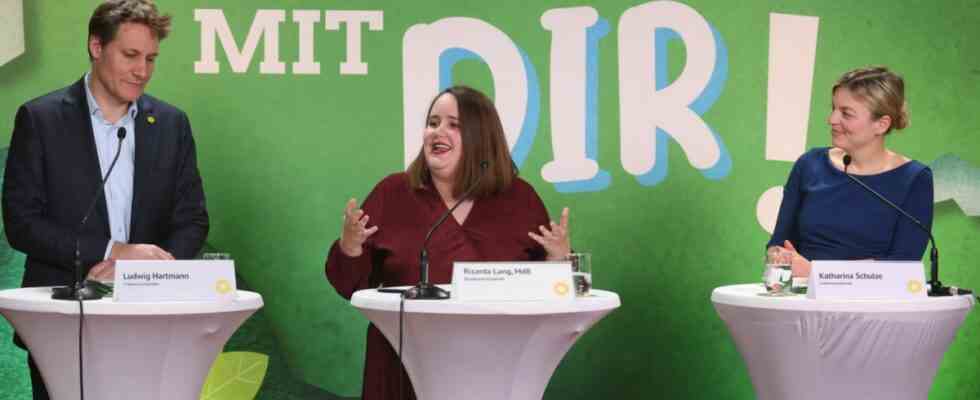The election year has begun, and at their winter retreat in Bad Wörishofen, the Greens parliamentary group has been outlining how they imagine the energy transition in Bavaria to be, how they would shape it as a governing party: as a major joint project for everyone and with everyone. The Green MPs are also ready to go on Friday morning, with the electric bus they are supposed to go on an excursion to a hydroelectric power station, among other things. And then this! The electric bus, which has been serving local public transport in Bad Wörishofen for seven years, “stretched its wings” in the morning, the works manager of the public utility company confesses into the microphone. The faction leaders Ludwig Hartmann and Katharina Schulze are sitting with their troops in a diesel bus, which then chugs through the snowy Allgäu. It doesn’t help.
an omen? In any case, to ensure that the energy supply and mobility of the future are not a sure-fire success. At first glance, the Greens themselves are actually off to a good start in the election year. The latest BR24 Bayern trend showed 18 percent, clearly the second strongest force; the survey values have been so constant since 2018 that one can certainly assume that there is a core following in the Free State. On the other hand, there is the specific question of power, which is already slowly growing into a dilemma in this early phase of the election campaign: A traffic light alliance of whatever kind is far from imaginable in the opinion of the polls. And Markus Söder never misses an opportunity to keep renewing his rejection of black and green; he wants to continue with the Free Voters. But Söder does not say that it is simply more comfortable with the FW. Nor does he say that nothing has come of black-green or Jamaica in the federal government and that there is therefore no compelling national trend. No, just this week at the CSU retreat in Kloster Banz, the Prime Minister said again that it basically doesn’t work. The Greens have a “completely different value system” and “no Bavarian gene”. In short: not an option.
The Greens would like to have a say in government, and Ludwig Hartmann recently criticized the rejection as “arrogance of power”. Some in the party hope that in 2023 there will still be pressure on Söder from society, possibly from the Bavarian economy with all its energy concerns, not to simply wipe the model off the table. First, however, the Greens have decreed the slogan: become so strong that you cannot get past them. What would that look like? Hartmann says: “20 percent plus a very, very big X.” That sounds, to keep his style: very, very ambitious. How can this succeed? Especially with a focus on energy, climate and the transformation process of the economy. October 8 must be “for a referendum on energy policy in Bavaria”. If the state elections were a poker game, one could say: The Greens are going “all in” with their core issue. Your “DNA”, as Hartmann calls it.
Consequently, the exam program is explained. The day before, the group in Fuchstal in the Landsberg am Lech district explored wind turbines and heat storage systems, and the community wants to be self-sufficient in terms of energy by 2030. Pioneers are at home in the region, praises Hartmann, who has a “hands-on spirit”. The fact that on Friday you unfortunately go on an excursion in a diesel bus is quickly forgotten. It goes to the Bad Wörishofen water reservoir, the spa town needs a lot of it: the thermal baths, the Kneipp facilities, whose culture has its home here, milk works. Then there is a detour to the hydroelectric power station on the Wertach, Hartmann and others ask many questions, for example about the groundwater level. Sometimes into the hum of the turbine, sometimes in the snow flurry at the reservoir.
Ricarda Lang was a guest in Bad Wörishofen
The parliamentary group developed a package of measures for a “new climate community in Bavaria” during the retreat. More wind turbines and solar power, logically, also hydroelectric power, geothermal energy, biogas. The position paper says: “Nuclear and coal? Has no place in the electricity system of the future.” The Greens are demanding that all communities in Bavaria should be part of the energy transition, and that weaker ones should be supported. Citizen participation should also be expanded, the foundation of the energy transition must be placed in their hands. One of many suggestions: discounted electricity tariffs for people living near wind turbines. In order to “fill the climate community with life”, the Greens want to invest ten billion euros in the coming election period. This is “only a fraction of what we would have to pay for impending climate damage by doing nothing”. In addition, ambitious climate protection acts as an economic engine. Prime Minister Söder, says Katharina Schulze, not only overslept the energy transition like his predecessor Horst Seehofer – but has still not understood that things have to move faster. With the Greens in the coalition, one hears everywhere at the retreat, it would of course be different.
This is also the argument of the Green Party leader Ricarda Lang, who is a guest in Bad Wörishofen, that she also wants to come to Bavaria for the political Ash Wednesday this year. The state elections have an impact on all of Germany. Because the transformation depends on “whether Bavaria goes along with it,” she says. The CSU alone, without the Greens, cannot manage the energy transition. And to Söder’s categorical rejection? Ricarda Lang advises him not to rely on “ideological commitments”. And anyway, the voters decided in October “what’s good for Bavaria”.

